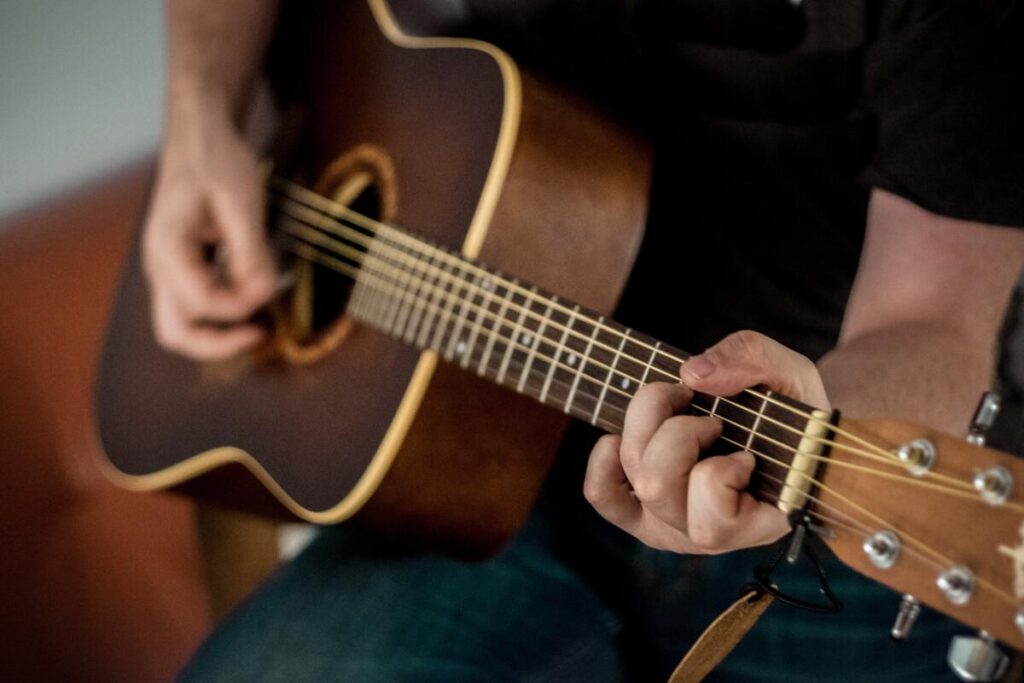Acoustic or Electric? In my opinion, the answer to this age-old question is: Learn on acoustic guitar first. Let me explain why…
Before I start, DISCLAIMER! This is my own personal opinion. Many have started their guitar-playing journey on an electric guitar (including me), instantly falling in love with the addictive sound of too-loud distorted electric guitar. Indeed, to some, the acoustic guitar may seem old-fashioned, irrelevant, or simply not as much fun. I’m fine with that, but in my experience, from a purely learning the instrument point of view, I wish I’d started on the acoustic guitar for the following reasons:
Acoustic or electric? You’ll be ready to start learning faster on an acoustic guitar.
An unfortunate analogy to start with, but the acoustic guitar doesn’t even require the plug of plug-and-play. Just pick it up, tune-up, and you’re away. An electric guitar immediately hinders you by needing an amp with a socket to plug it into, and a guitar cable.
First blood to the acoustic guitar.
Acoustic or electric? An acoustic guitar is cheaper than an electric guitar setup.
Following on from the first point, Say for example you had £200 to spend. That £200 is going to get you a much better acoustic guitar than an electric guitar + amp + lead package.
Case in point: £200 will get you a really decent Yamaha 800 series acoustic guitar. These have solid tops, can compete with guitars costing twice as will see you through to the end if need be. That same £200 will just about get you into the lowest level Squier guitar/amp package territory, which comes nowhere near the Yamaha in terms of anything really.
Thinking of going pre-owned? As we’ll cover later, there’s more to go wrong on an electric guitar so more to watch out for in the used market.
Acoustic or electric? In the beginning, acoustics guitars sound better than electric guitars.
So you’ve started from the beginning, the E chord. Now, unless you’ve miraculously been blessed with an instant grasp of dialing in a great amp tone, that E is going to sound fuller and cleaner on acoustic guitar, and that’s going to inspire you to keep progressing.
Bare with me on this one. I started out on electric guitar, a cheap Hondo Strat into one of those fly-spec headphone amps. It sounded terrible, but I wasn’t aware back then. For some bizarre reason, I thought a great place to start was learning the ‘Who Want’s to Live Forever’ solo from Queen’s Live at Wembley ’86 video. I learned it. It sounded nothing like Brian May. I was discouraged.
If I’d gotten an acoustic guitar and learned chords first (which I should have done), I would have made much more progress, in less time, and saved money!
Acoustics guitars are simpler than electric guitars.
An electric guitar has pickups, a pickup selector (most of the time), volume and tone controls, and an output jack. An acoustic guitar has none of these, so you get a) more bang for your buck b) fewer things to deal with c) less to go wrong. An acoustic guitar focuses the mind on the fretboard and learning the instrument.
Sure, whammy bars and controlled harmonic feedback are stupendously good fun, but, as I’ll keep repeating…
Not yet
Acoustic guitars are more suitable for beginners.
Taking all the previous points into account, I’ve concluded that acoustic guitars are more suitable for beginners. You’re going to want to get set up with the minimum of fuss and cost, have a good tone, and not be concerned about the intricacies of amps or pickup selection, yet! And that’s why you should learn on an acoustic guitar.
A final point I’d like to make is with regard to the way an acoustic guitar plays and is setup: It kind of focuses you on open chords, and gets more difficult as you move up the fretboard. There’s usually more space on an acoustic guitar for open chords, with an electric being, more often than not, more cramped near the nut. Sure, an electric guitar is easier for lead, but, as I said before, never start with playing lead!
You might ask ‘Why not learn lead first?’. Fair question. Learning lead is not as transferable as learning chords. If you learn chords first, that opens the door to popular songs, songwriting and gives you a thorough grounding for things to come like barre chords and later on, scales and lead playing. If you try to learn lead first, as I did (wrongly), all you’ve done is learn a lick, parrot-fashion, you can’t really take that as far as learning a chord will take you. You’ve run before you can walk. Later on, you’ll gain a lot by analysing other players’ riffs and licks, but, as a beginner, you haven’t reached that level…
Not yet
So, If your thinking about learning guitar, take it from my experience, get yourself an acoustic guitar, and learn open chords. You won’t regret it!
Or ignore me, get an electric guitar and an amp, annoy the neighbours, and have a wail of a time anyway. I can’t promise you’ll progress as quickly, but I can guarantee it’ll be fun either way!
Good luck on you journey.
Adam

You should learn acoustic guitar because it’s harder to play at first and will make your hands and fingers stronger. You should learn an electric guitar because it’s not easy to play. Whatever the guitar must be, make sure to align the guitar bridge first, or you might start false tuning the guitar.